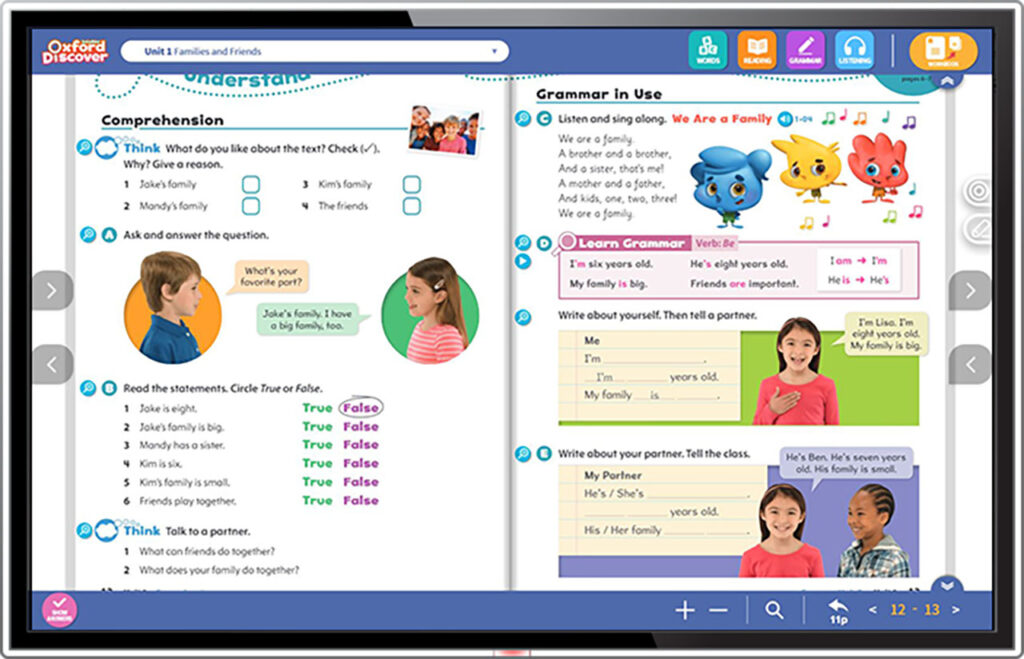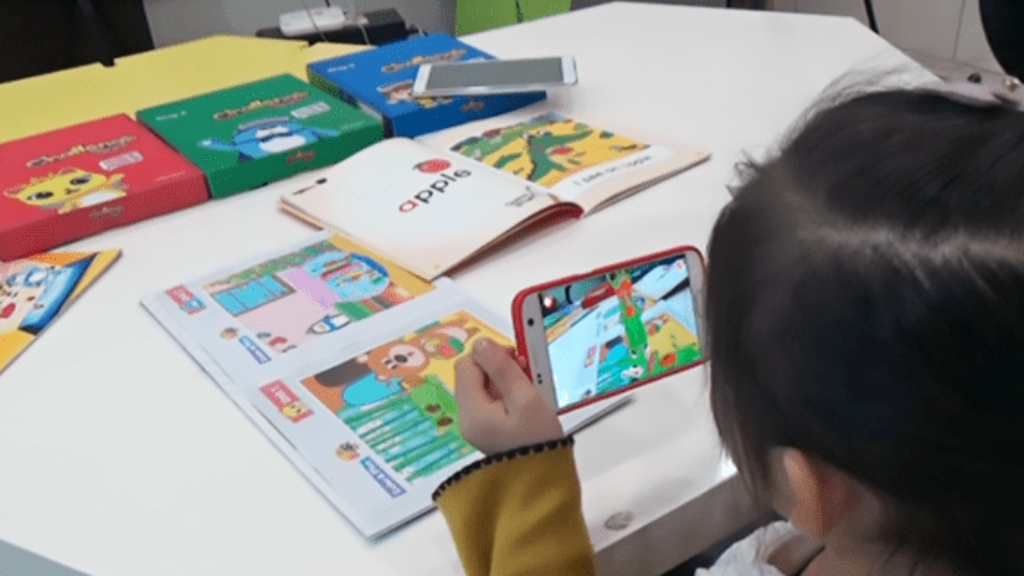What is Elementary English?
Definition
English level A1 is the first level of English in the Common European Framework of Reference (CEFR). Namely, it is the ability to understand and use very simple familiar phrases and expressions, to communicate in simple, everyday tasks that require only simple and direct exchanges of information on familiar topics.
Here is what can be done at the A1 elementary English level.
- I can understand and answer simple questions about myself, such as my name, age, and place of residence;
- I can understand and follow simple instructions;
- I can express my needs and wants in simple sentences and expressions;
- I can read and understand simple text such as signs and menus;
- I can write simple sentences and messages.
Students at this stage are still growing, and their English skills can continue to improve. Students who learn English as children can quickly learn new words and phrases. They will be able to understand and answer more complex questions and instructions. It is also certain that their English skills will continue to improve over time.
CEFR levels and standards
CEFR stands for Common European Framework of Reference for Languages. Six levels describe the learner’s ability to use the language. The levels range from A1 (beginner) to C2 (proficient).
- A1
- Learners can understand and use familiar phrases and expressions that are very simple;
- They can communicate on familiar topics using simple and everyday expressions.
- A2
- Learners can understand sentences and common expressions about familiar topics, including very basic personal and family information, shopping, places of interest, and work;
- They can communicate in simple, everyday tasks that require only simple and direct exchanges of information on familiar topics.
- B1
- Learners can understand the main points of clear texts on familiar topics that they encounter regularly in professional, academic, leisure, and other situations;
- They can handle most situations that may arise while traveling in an English-speaking area;
- They can compose simple, organized texts on familiar topics.
- B2
- Learners can understand the main ideas of complex texts on concrete or abstract topics, including some technical discussions;
- They can express themselves fluently and spontaneously enough to comfortably communicate with other English speakers;
- They can produce clear, detailed text on many subjects and explain a complex viewpoint on a topic, including expressing advantages and disadvantages.
- C1
- Learners can understand a wide range of more difficult, longer texts and recognize implicit meanings;
- They can express themselves fluently and spontaneously with little need to search for the right expression;
- Even in the most complex situations, learners can discern subtle differences in meaning.
- C2
- Learners can easily understand almost anything they hear or read;
- They can summarise information and arguments from different spoken and written sources, and present them coherently and concisely;
- They can express themselves fluently, accurately, and spontaneously, and can distinguish subtle differences in meaning even in very subtle or complex situations.
The CEFR is a useful tool for determining a learner’s level of English and setting language learning goals. There are many tools available to help learners assess their English level and improve their skills.

Why do we need elementary English?
The position of English in the world
English is the most widely spoken language in the world, with over 1.5 billion speakers. English is the official language in 53 countries and territories. Many more countries use it as a second language.
The status of English as a native language around the world continues to evolve. In some countries, such as the United States or the United Kingdom, English is the native language of the majority of the population. In other countries, such as India and Singapore, English is a common language for communication between people whose native language is different.
In the United States, English is the official language, and most people speak English. However, there are also many Spanish speakers in the United States, and there is a growing movement to use Spanish as a common language.
Although English is not an official language in India, it is often used as a second language. English is used in government, business, and education and is considered a gateway to economic opportunity.
English is the official language in Singapore and is used in government, business, and education. However, many people speak Chinese, Malay, and Tamil, which are also used in government and education sectors.
Overall, the state of the elementary English language is growing and evolving worldwide. As a common world language, English is gaining more and more importance and will continue to do so in the future.
Why is elementary English important?
There are several factors contributing to the growth of English worldwide. One factor is the increasing globalization of the economy. As businesses and organizations become more global, communication with people in different countries is essential. English is often used as a common language for this communication.
Another factor is advances in technology. The Internet and other forms of electronic communication have made it easier for people around the world to communicate with each other. English is often the language of this communication. Basic language use in the world will continue to evolve. As the world becomes more interconnected, the importance of English as a global language will continue to grow.

Essentials for elementary English teachers
Problems faced by English teachers
In countries where English is not the first language, students learn English as a second language. However, teaching English to non-native speakers is not an easy task. In this section, we will describe the problems that English teachers face.
Many elementary schools lack the resources necessary to teach English effectively. These include access to textbooks, teaching materials, and technology. An abundance of resources can help students learn English by creating an engaging and effective classroom environment.
In many countries, there is also a shortage of qualified English teachers. This means that many elementary school teachers either lack the training to teach English or do not have the necessary skills and knowledge. In particular, curriculum plays an essential role in identifying and organizing the key elements of instruction. To teach students step-by-step, a meticulous curriculum is required. However, some teachers come to class with the wrong curriculum and fail to teach their students effectively.
In addition, English teachers may have to overcome language barriers when teaching English in elementary schools. Some elementary school students need more motivation to learn English. This may be due to various factors, such as the way English is taught, students’ interests, or their perception of the importance of English in their lives.
It may be necessary to involve parents in students’ English learning to improve the effectiveness of instruction. English teachers may need to inform parents about English language learning or invite them to participate in school activities.
Despite these challenges, English teachers can play an essential role in helping students learn English. English teachers can use their creativity and adaptability to find ways to make learning English fun and exciting for their students.
Governments and educational institutions can provide schools with more resources, such as textbooks, teaching materials, and access to technology. This will help teachers teach English more effectively.
Teachers can make English more relevant to their students by integrating English into everyday life. For example, teachers can use English to teach other subjects such as science or math. They can also use English to engage students in activities that interest them, such as music or sports.
It is essential to know that there is no one-size-fits-all solution to the problem of teaching English in elementary schools. The best answer will depend on your specific situation. However, the solutions listed above can serve as a starting point to address these issues.

Elementary English teacher’s mindset
Teachers face many challenges, both while teaching and in classrooms abandoned by students. Teaching is very rewarding, but sometimes no one recognizes the challenges teachers face. However, we must remember that no one in our society has as much influence as a teacher.
Here is an introduction to the mindset that elementary English teachers should have to teach successfully.
- Passion for English
Teachers who are passionate about English are more likely to teach English successfully. These teachers are enthusiastic, dedicated, and more likely to create a positive learning environment for their students.
- Creativity and adaptability
English teachers need to be creative and adaptable to meet the needs of their students. They should be able to find ways to make learning English fun and exciting, and they should be able to adapt their teaching methods to the different learning styles of their students.
- Patience
Learning English takes time and effort. Teachers should be patient with their students and help them learn at their own pace. They should also not be discouraged if students are not progressing as quickly as they would like, but be patient.
- Encouragement and support
Teachers should encourage and provide feedback to students and help them overcome difficulties. They also should support parents and other stakeholders involved in students’ English learning.
In addition to these general mindsets, there are several specific strategies that English teachers can use to teach more effectively. Let us take a closer look at the practical examples of elementary English teaching below.

A practical example of an elementary English lecture
Teaching elementary English through EdTech
Surveys show that 92% of elementary school teachers use EdTech in their classrooms. The most common uses of EdTech are education, assessment, and communication.
Elementary teachers indicate that they benefit from EdTech in several ways.
- Increase student engagement: EdTech can help increase student engagement by making learning more interactive and fun. Teachers can use EdTech to create games, simulations, and other activities that engage students.
- Improved learning outcomes: EdTech can help improve learning outcomes by providing personalized lessons and feedback to students. Teachers can use EdTech to track student progress and deliver personalized lessons to students who need them.
- Increased teacher productivity: EdTech can help increase teacher productivity by automating tasks such as grading and attendance. It allows teachers to focus on more important tasks like planning lessons and interacting with students.
- Improved communication with parents: EdTech can help improve communication with parents by giving them access to student progress reports and other information. This can help them stay involved in their child’s education.
Overall, this article has shown that EdTech is a useful tool for elementary teachers. EdTech can help increase student engagement, improve learning outcomes, increase teacher productivity, and improve communication with parents.
Specific case
We have found that many elementary school teachers are indeed using EdTech to organize their classrooms. In this section, we look at a few examples of how teachers use EdTech in practice.
- Virtual zoo tour
Students who could not visit the zoo in person had the opportunity to experience the zoo virtually.
- A personalized learning plan for each student
Teachers could differentiate instruction and provide each student with the resources they need.
- Tracking progress and providing feedback
Teachers were able to individually assess each student for what difficulties they were having and give them additional help.
- Communicating with parents about their child’s progress
Parents could stay involved in their child’s education and provide support at home.
These are just a few examples of how EdTech can benefit elementary teachers and students. As EdTech continues to evolve, we expect to see even more opportunities to use technology to improve education.
There are many more EdTech resources for the English classroom.
- Online courses: Accessible from anywhere with various features such as interactive exercises, video lessons, and quizzes;
- Virtual classrooms: Students and teachers interact in real-time, providing personalized lessons and feedback.
- Games and apps: Games and apps can be fun and help students learn new vocabulary and grammar concepts;
- Digital textbooks: Digital textbooks are becoming increasingly popular and offer several advantages over traditional textbooks. Digital textbooks are easily customizable and include interactive exercises and other features that help students learn more effectively.
- Podcasts and audiobooks: Podcasts and audiobooks are a great way for students to listen to English and improve their listening comprehension. There are a variety of podcasts and audiobooks designed specifically for English language learners, available for free or for a fee.

Conclusion: New and unique teaching strategies for an engaging classroom experience
Teaching strategies to improve teaching effectiveness
English teachers must use a variety of teaching methods to engage their students. For example, a game, an activity, a song, or a story. A teaching method that uses these multimedia resources or content can be more engaging and memorable for students than traditional textbooks.
In addition, teachers should not teach English using textbooks only. Unlike a native language, a second language is not necessarily used in daily life. Therefore, English taught only in a classroom has no practical meaning and may not improve students’ skills. Therefore, English teachers need to make English more relevant to students by integrating it with other subjects such as science or math, or other social studies. This will greatly help students realize the importance of English in everyday life.
English teachers should give students opportunities to practice their English skills. Get them used to reading, watching, and listening by giving them homework, having discussions, or watching English movies and TV. Elementary school students will have a hard time getting comfortable and interested in the English language if all they do is memorize and write.
Did students improve their English skills through these different strategies? If so, actively celebrate their progress. This motivates them and creates an incentive to continue learning.
Using EdTech to enhance elementary English teachers’ lessons
The above case shows that most elementary English teachers are actively using EdTech. If you are not sure how to get started with EdTech, or if you need a detailed explanation of how it can benefit you, check out AllviA. The AllviA EdTech platform was developed by VISANG EDUCATION and can be used to create interactive and fun engaging activities.
- EdTech can track student progress and provide personalized training to students who need it;
- AllviA can personalize English learning for each student. The LMS allows to monitor student progress and provide additional support as needed;
- EdTech can make English language learning accessible to all students;
- Through Zoom video calls, AllviA can provide equal English learning to students from remote areas or those who can’t attend school. Access is available anywhere there is an Internet connection, as students do not need to be in a classroom.
- EdTech can be a cost-effective way to teach English;
- AllviA is an EdTech platform that incorporates 25 years of expertise from VISANG EDUCATION, a company that produces and publishes textbooks. Through a thorough step-by-step analysis of English language teaching, the curriculum contains a high level of understanding so you can teach as efficiently as possible. In addition, teaching through the AllviA platform is cost-effective bec
- ause it can replace traditional textbooks and other materials.
EdTech can be a useful tool and companion for elementary English teachers. Teachers who want to make English learning more fun and effective should check out the demo version of AllviA.







